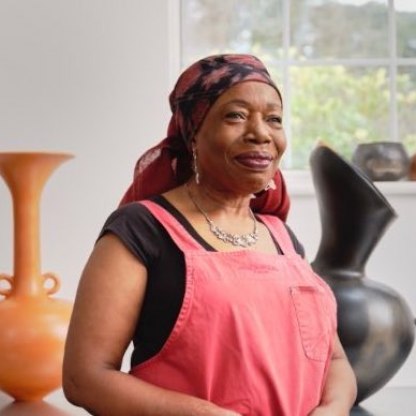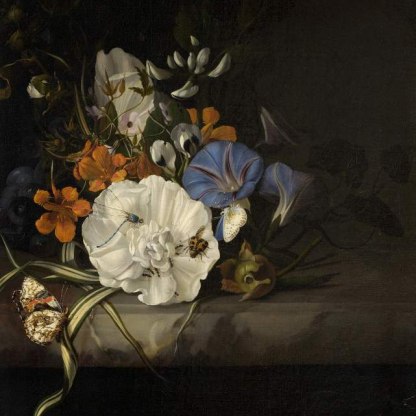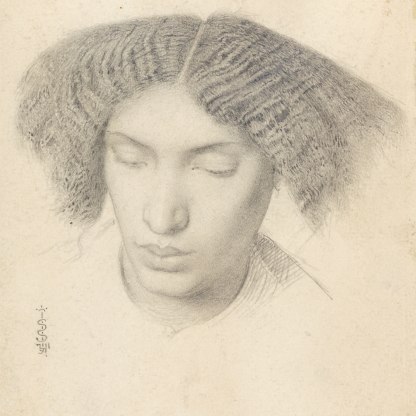Magdalene Odundo Audio: Memories of Nigeria

Listen to this audio clip to hear Magdalene Odundo DBE speak about her memories of visiting Nigeria.
Part of the exhibition, Magdalene Odundo in Cambridge, on display at The Fitzwilliam Museum, Cambridge between 5 October 2021 and 24 July 2022.
Presenters
About the object
Large hand-coiled stoneware water jar. Impressed and incised decoration in the traditional Kwali style, with scorpion, snake, fish etc. and geometric design in white slip. The dark-green background is covered with a clear glaze.
Bought by Shakeshaft from Stephen Woodruff at the 'Earth & Fire' fair at Rufford Abbey Country Park. 26th June 1999
Acquisition and important dates
- Method of acquisition: Bequeathed
- Dates: 2016
Dating
Label text from the exhibition ‘Things of Beauty Growing: British Studio Pottery’ on display at The Fitzwilliam Museum from 20 March until 17 June 2018: Nigerian potter Ladi Kwali grew up making unglazed water jars, in the style particular to the Gwari region. In 1954, she joined British potter Michael Cardew at his Pottery Training Centre in Abuja (the Nigerian capital) where she learned to throw and began working in glazed stoneware. After this time, she made heavier, glazed pots, incised with patterns of lizards, birds, scorpions, and snakes, as seen here. Kwali made these by walking around the pot, coiling the clay and thinning out the pot. In 1962, she toured England, giving ten popular pottery demonstrations, raising her international profile before returning to Nigeria in triumph. In 1972, she made a further demonstration trip to the USA.
Ladi Kwali is celebrated as one of Nigeria’s most successful artists. She was made a Member of the Order of the British Empire (MBE) in 1963, was given an honorary doctorate from Ahmadu Bello University, northern Nigeria, as well as the Nigerian National Merit Award (the highest award for academic achievement) and was made Officer of the Order of the Niger, in 1981. The Abuja Pottery Training Centre was renamed the Ladi Kwali Pottery Centre in her honour. She also appears on Nigerian currency, on the 20 Naira note!
Michael Cardew taught Kwali to throw on a wheel but mostly she made pots using the local method learnt from her aunt, positioning a pot on a stool or low table and walking around it, coiling the clay and thinning it as she went. Although this piece is called a ‘water jar’, it was not made to be functional but was intended as an exhibition piece for European collectors. It is covered with animals, which Kwali incised and cross-hatched from imagination, without a sketch or plan.
This water jar was made by potter Ladi Kwali, who was born and raised in the Gwari region of Nigeria. As a child, Kwali’s aunt taught her how to make pots in the local, traditional style. Kwali was highly skilled and her pots became popular. Some pots were in the collection of the local leader, the Emir of Abuja, where they were seen by British studio potter, Michael Cardew, when he visited Nigeria in 1950. Cardew set up a local Pottery Training Centre in Abuja (the Nigerian capital) and invited Kwali to join him. Her work was subsequently shown in exhibitions around the world and Kwali joined Cardew on demonstration and lecture tours to Europe (1962) and the United States (1972).
- 20th Century
- Production date: AD 1957
Maker(s)
- Kwali, Ladi, MBE Potter
Note
Label text from the exhibition ‘Things of Beauty Growing: British Studio Pottery’ on display at The Fitzwilliam Museum from 20 March until 17 June 2018: Nigerian potter Ladi Kwali grew up making unglazed water jars, in the style particular to the Gwari region. In 1954, she joined British potter Michael Cardew at his Pottery Training Centre in Abuja (the Nigerian capital) where she learned to throw and began working in glazed stoneware. After this time, she made heavier, glazed pots, incised with patterns of lizards, birds, scorpions, and snakes, as seen here. Kwali made these by walking around the pot, coiling the clay and thinning out the pot. In 1962, she toured England, giving ten popular pottery demonstrations, raising her international profile before returning to Nigeria in triumph. In 1972, she made a further demonstration trip to the USA.
Ladi Kwali is celebrated as one of Nigeria’s most successful artists. She was made a Member of the Order of the British Empire (MBE) in 1963, was given an honorary doctorate from Ahmadu Bello University, northern Nigeria, as well as the Nigerian National Merit Award (the highest award for academic achievement) and was made Officer of the Order of the Niger, in 1981. The Abuja Pottery Training Centre was renamed the Ladi Kwali Pottery Centre in her honour. She also appears on Nigerian currency, on the 20 Naira note!
Michael Cardew taught Kwali to throw on a wheel but mostly she made pots using the local method learnt from her aunt, positioning a pot on a stool or low table and walking around it, coiling the clay and thinning it as she went. Although this piece is called a ‘water jar’, it was not made to be functional but was intended as an exhibition piece for European collectors. It is covered with animals, which Kwali incised and cross-hatched from imagination, without a sketch or plan.
This water jar was made by potter Ladi Kwali, who was born and raised in the Gwari region of Nigeria. As a child, Kwali’s aunt taught her how to make pots in the local, traditional style. Kwali was highly skilled and her pots became popular. Some pots were in the collection of the local leader, the Emir of Abuja, where they were seen by British studio potter, Michael Cardew, when he visited Nigeria in 1950. Cardew set up a local Pottery Training Centre in Abuja (the Nigerian capital) and invited Kwali to join him. Her work was subsequently shown in exhibitions around the world and Kwali joined Cardew on demonstration and lecture tours to Europe (1962) and the United States (1972).
Place(s) associated
- Abuja
Identification number
- C.364-2016
- Full record
Other podcasts you might like
Sign up to our emails
Be the first to hear about our news, exhibitions, events and more…



